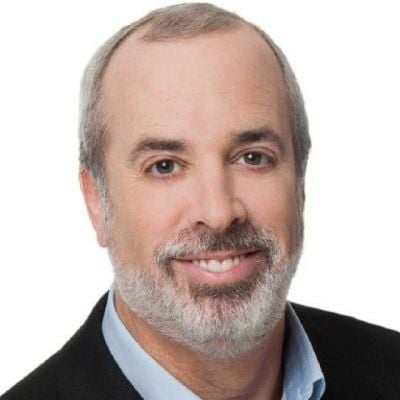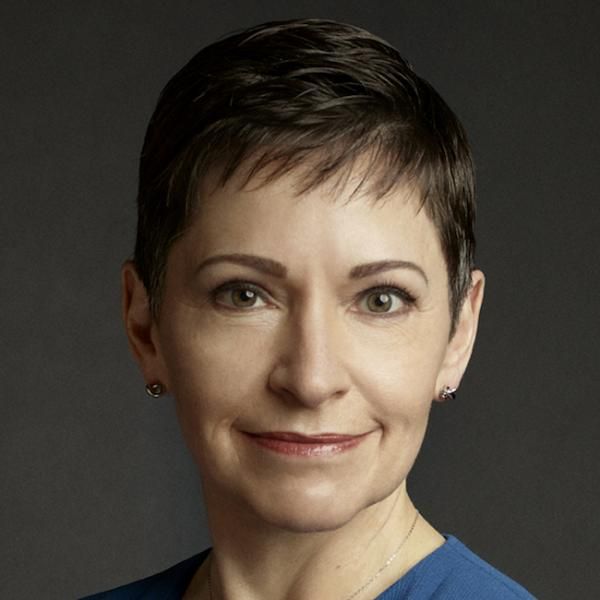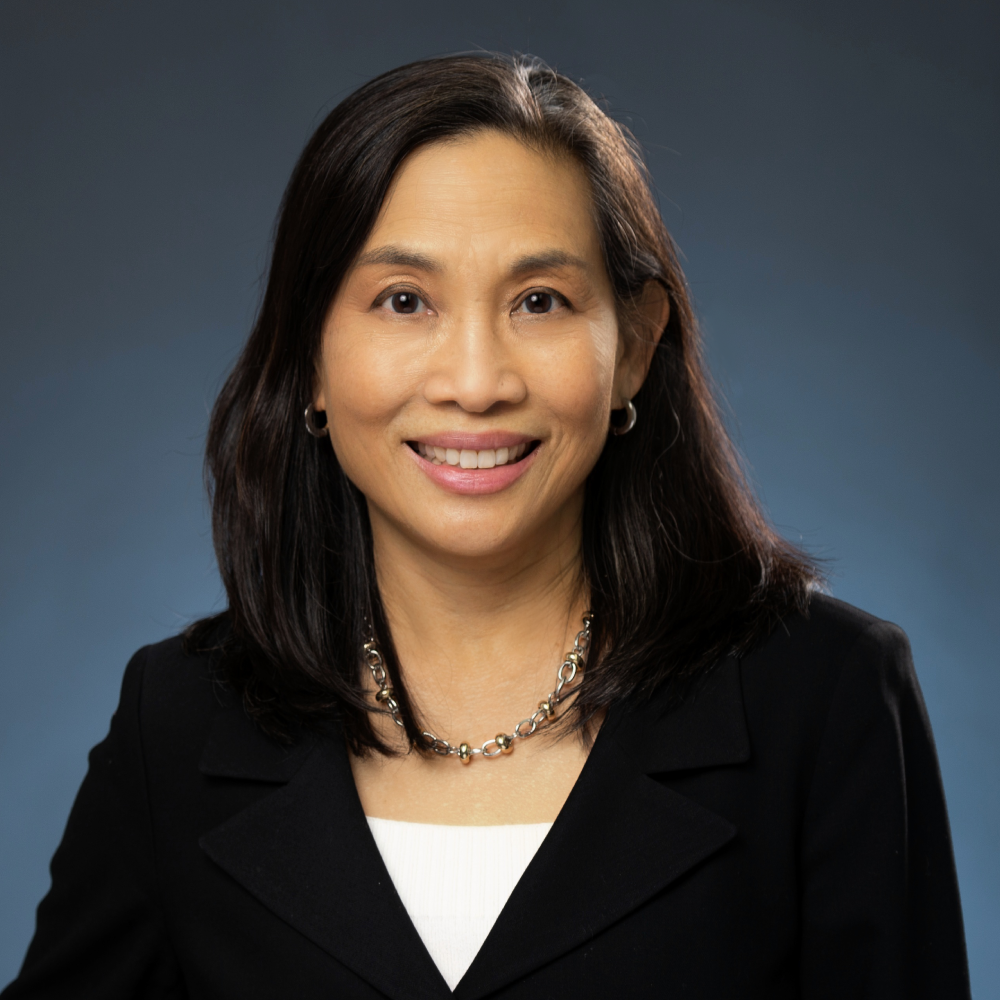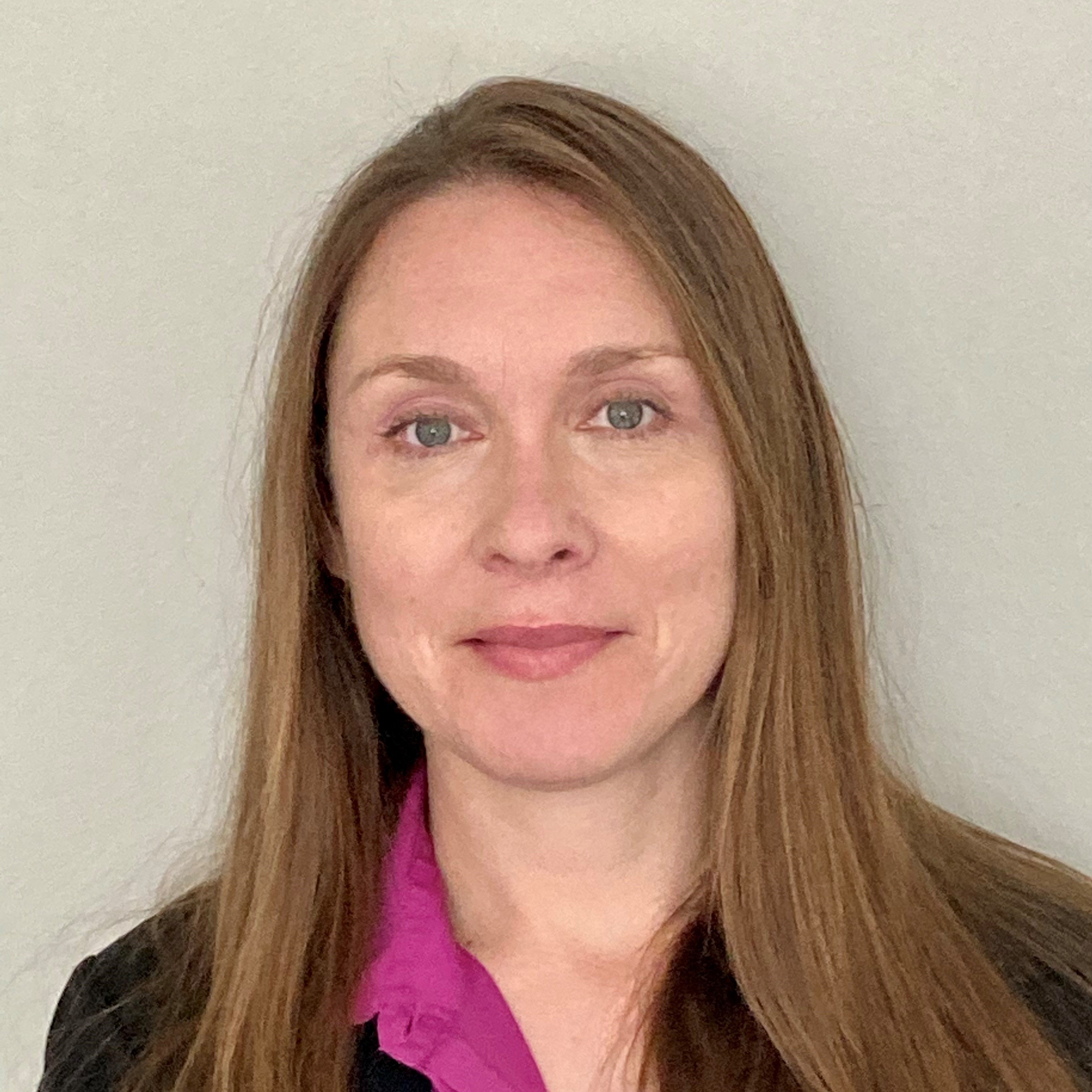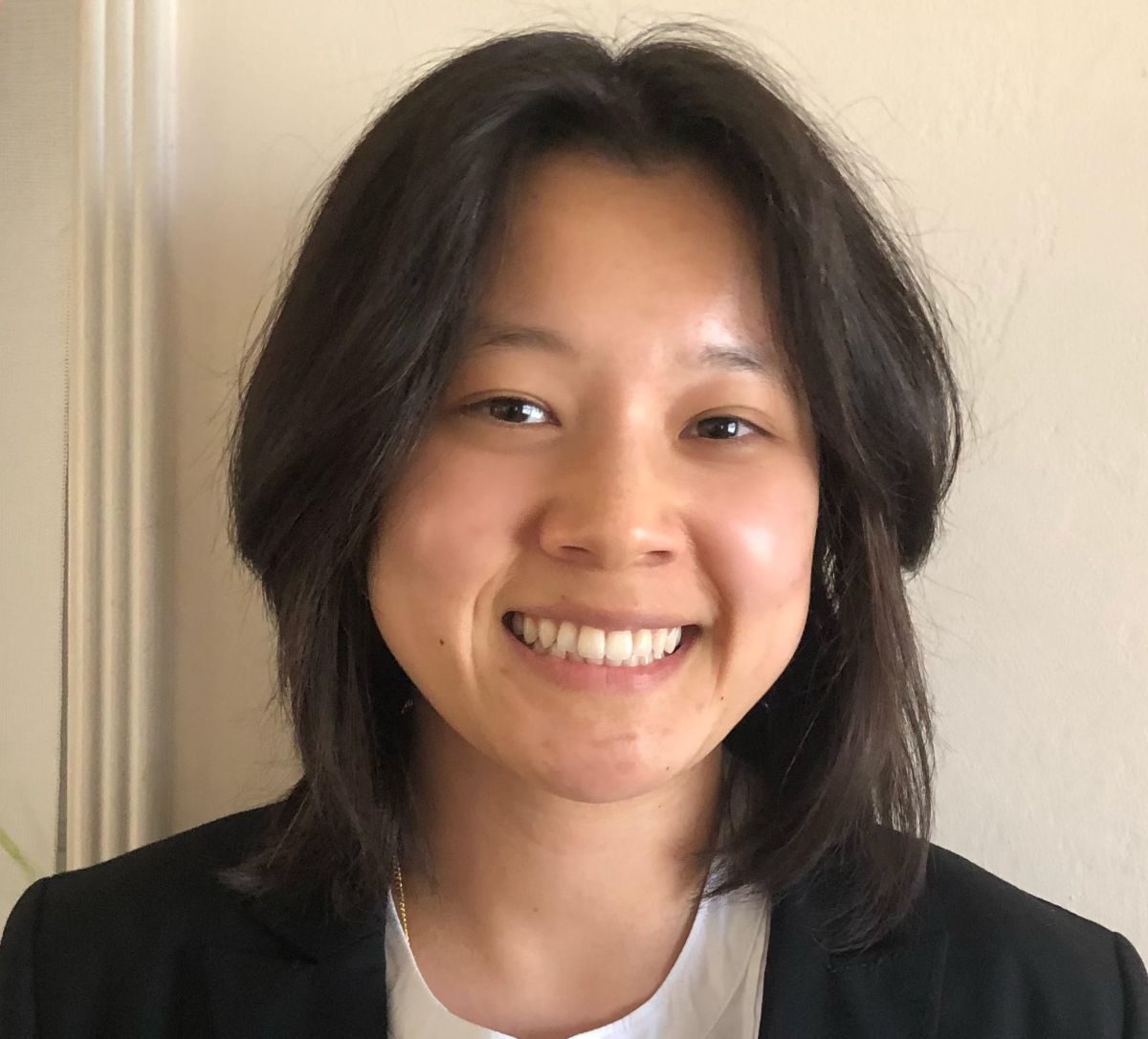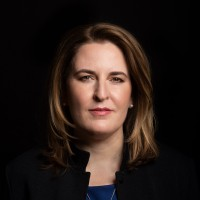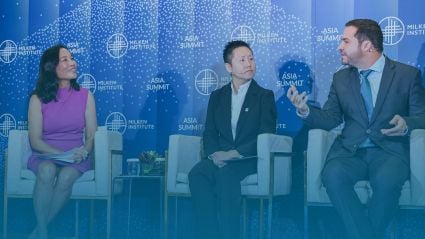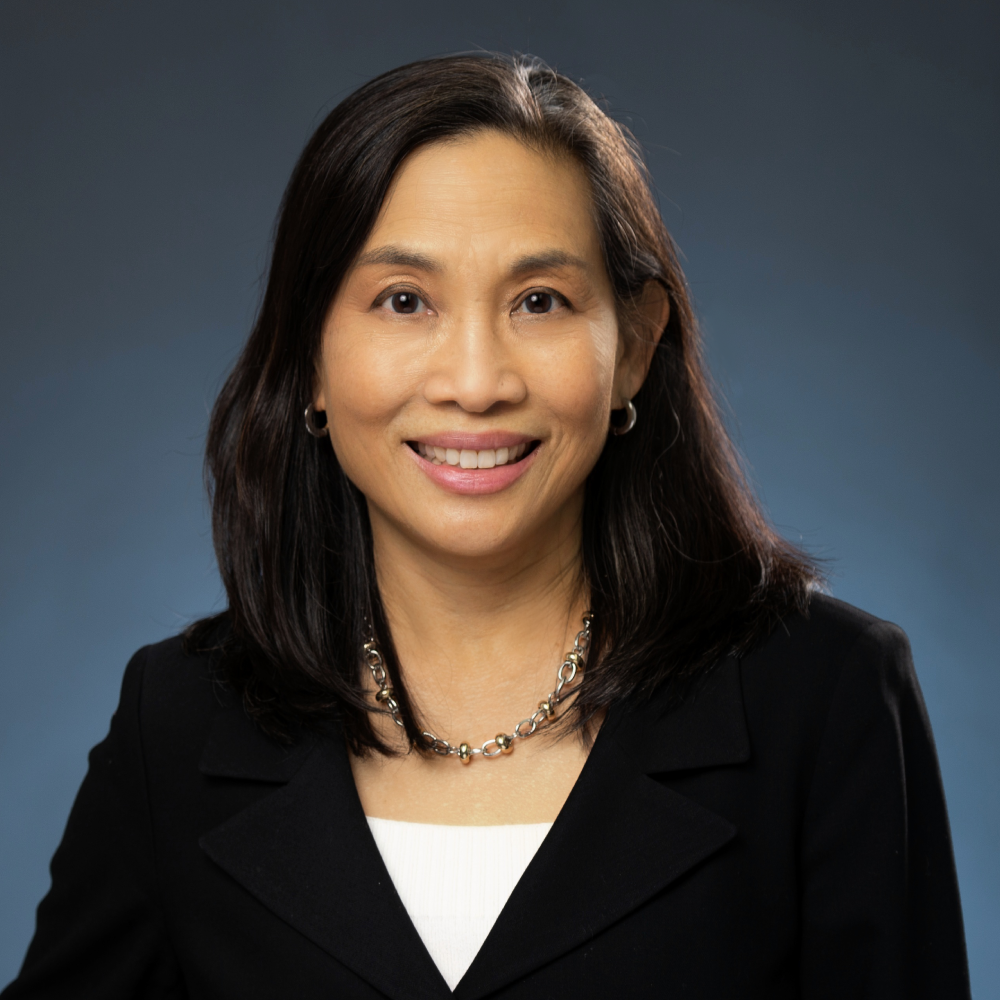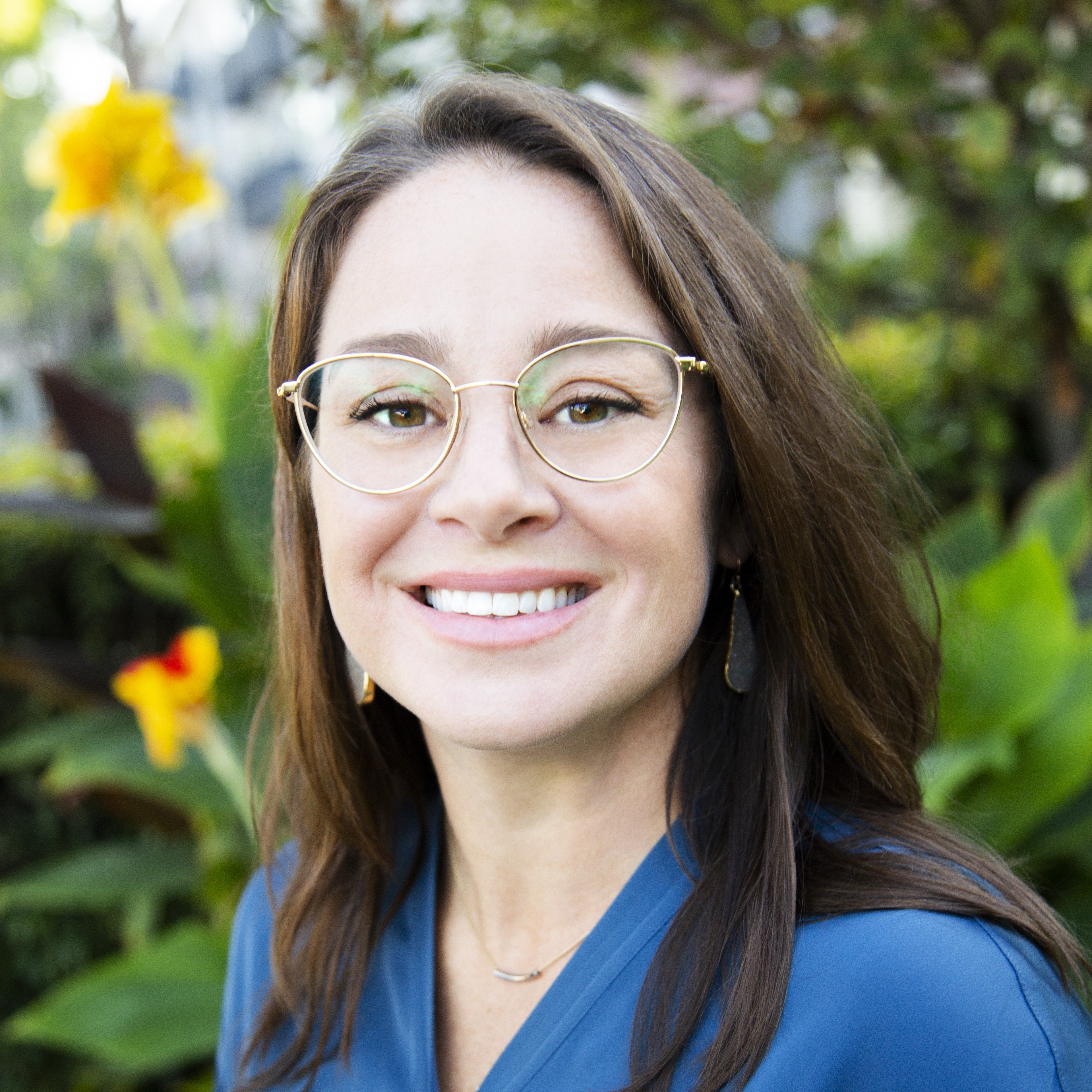
Executive Director's Note
Happy New Year! I am delighted to announce that I have been named executive director of the Center for the Future of Aging. We are grateful to Paul Irving, founding chairman of the Center, for his leading efforts to change aging. Paul will continue his advocacy as a Milken Institute senior fellow and in organizations including the USC Davis School of Gerontology, Encore.org, Stanford's Distinguished Careers Institute, and the National Academy of Medicine.
As I reflect on 2021, we all had to be more flexible as we navigated the uncertainties of a global pandemic. We saw more infections and deaths related to COVID-19, especially for older adults, despite the availability of vaccinations. Political unrest was a theme across the globe, as citizens reacted to economic disruption and restrictions on travel, work, and seeing loved ones. All of us were ready to kick the door shut on the tumultuous year.
Yet we also saw glimmers of hope as we witnessed resilience and ingenuity. At the Milken Institute, we were able to hold our Global Conference this past October in person in Los Angeles, with masks, vaccinations, and negative COVID tests required. In December, the Center hosted a roundtable on “Tech-Enabled Health and Home Care” from the Institute’s new conference space in Washington, DC. We were glad to reconnect to seek a brighter future for all generations. This newsletter provides a snapshot of our accomplishments, from efforts to improve dementia care to advancing technology to bridge gaps and support new models of care. We are thankful for our network and sponsors that helped us achieve these goals. I am looking forward to working with you all to broaden the positive impact of the Center for the Future of Aging. I would love to hear from you about what you think are the most critical issues related to population aging—a demographic shift that is changing the world. Please write me at [email protected].
Read, Watch, and Share the Latest from our Center leaders
"If they do nothing, then we're guaranteed that the costs are going to skyrocket." - Nora Super spoke with Modern Healthcare about the need to create a nationwide comprehensive dementia care program.
"Our health-care system is not set up to deliver person-centered services to people living with dementia and their caregivers. Rather, our traditional Medicare program is designed to reward volume over value—to discharge patients ASAP to make room for another paying patient—to order unnecessary tests, prescriptions, and procedures even if the patient cannot benefit from them." - Nora Super outlines how to improve care for people living with dementia in The Hill.
"I decided to share my story because I think so many of us who live with depression live in the shadows. We're afraid to tell our stories because of the tremendous stigma associated with depression and afraid something might happen to our career or our personal lives if others around us know that." - Nora Super shares her story and calls for better treatments in November's Health Affairs.
"Place plays a significant but often unacknowledged role in health and happiness. The right place elevates personal well-being." - Paul Irving wrote a foreword for Right Place, Right Time: The Ultimate Guide to Choosing a Home for the Second Half of Life by Ryan Frederick.
"This notion that older people are less capable learning new skills, new technologies, and adapting to new norms is just nothing but ageist." - Paul Irving discusses the dangers of discounting potential in WorkingNation Overheard.
"Difficulty managing finances can be an early sign of dementia. More and more leading financial institutions are emphasizing the need to assist clients who may have cognitive decline." - Nora Super delivered a keynote for Grove Point Financial on the role of financial advisors in helping people with dementia.
"We are just at the beginning of recognizing the possibility and potential these additional years provide."- Paul Irving argues that society still has too many fixed ideas about older adults’ capabilities in MarketWatch.
"Racial, gender, and age gaps must be narrowed and equitable policies and practices advanced. By building bridges to work, learning, health and hope, we can ensure that all in our communities look forward to their later years with a sense of possibility rather than fear." - Paul Irving explains how the pandemic is a turning point towards a better retirement future in MarketWatch.
Scaling Comprehensive Dementia Care
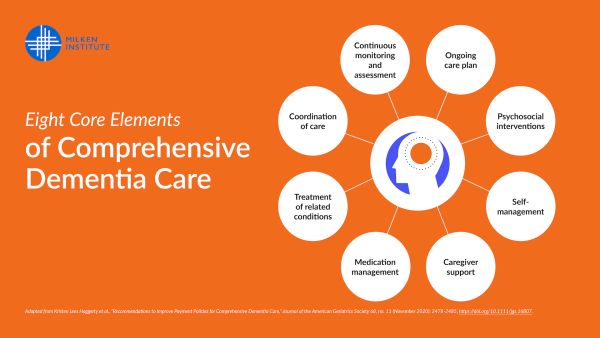
The Alliance to Improve Dementia Care's latest report advocates for comprehensive care models to improve the quality of life and reduce costs for people living with dementia and their caregivers. The report includes actionable recommendations to advance comprehensive dementia care models with effective payment policies. Alliance members Debra Cherry, David B. Reuben, and Sarah Lenz Lock contributed "Stories from the Field" about the barriers and opportunities in the delivery of comprehensive dementia care.
Advancing Tech-Enabled Health and Home Care

Front (l-r): Sarita Mohanty, President and CEO of The SCAN Foundation, and Zia Agha, Chief Medical Officer and Executive Vice President, West Health; Back: Lewis Levy, Chief Medical Officer, Teladoc Health, and Lauren Dunning, Director, Milken Institute Center for the Future of Aging.
The Center brought together experts in Washington, DC, to build consensus on how best to use technology to integrate health and home care. Building upon insights from our recent research, we explored gaps, identified promising initiatives, and formulated recommendations as we look toward the post-pandemic horizon. We appreciate our sponsors CVS Health, Home Instead, The Permanente Medical Group, Teladoc Health, and The SCAN Foundation for helping launch this new project.
Global Conference 2021
The Center's sessions at Milken Institute’s Global Conference, held in Los Angeles in October focused on financial security, intergenerational relationships, and the possibilities of extending healthy longevity. You can (re)watch all of the sessions from October's #MIGlobal here.
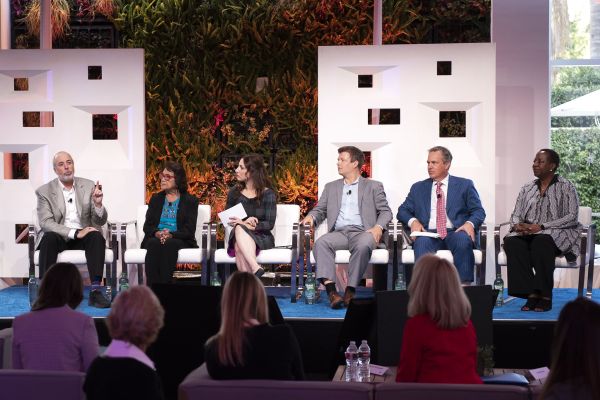
“Boomerang: The Intergenerational Dependencies Impacting Financial Security” with (from left to right) Ric Edelman of Edelman Financial Engines, civil rights activist Dolores Huerta, Caroline Servat of the Milken Institute (moderator), Aaron Smith of Savi, Jeff Huber of Home Instead, and Angela F. Williams of United Way Worldwide.
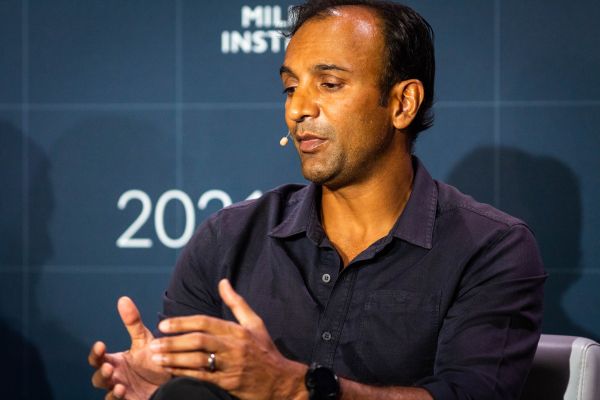
“Bots, Bytes, and Brains: Extending Longevity Through Technology” with Rhoda Au of Boston University, Shai Efrati of Tel-Aviv University, Susann Keohane of IBM, Carol Massar of Bloomberg (moderator), DJ Patil of Devoted Health (pictured), and Grant Verstandig of Red Cell Partners.
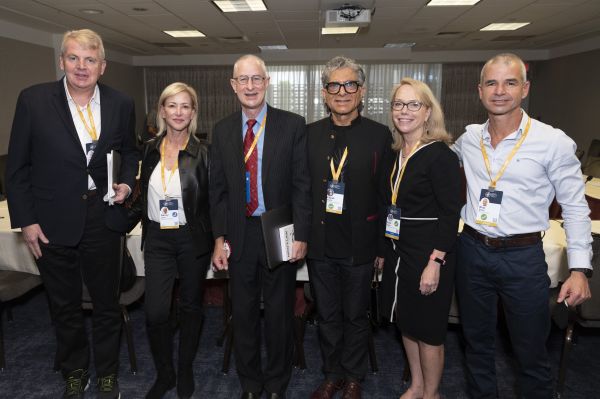
“Age-Less: How Scientific Advances Will Upend 21st Century Aging.” This invite-only session sponsored by BrightFocus Foundation featured (from left to right) Jim Mellon of Juvenescence, Nancy Lynn of BrightFocus Foundation, Pinchas Cohen of USC, Deepak Chopra of the Chopra Foundation, Nora Super, and Shai Efrati of Aviv Clinics.
From Our Board
-
Tivity Health, led by Richard Ashworth, conducts a twice-monthly survey of key healthy living indicators for the general senior population. The November 8th survey found that consistent social isolation is up 2.5x from pre-covid levels, 10 percent versus 4 percent, with those with low incomes reporting higher incidence at 24 percent.
-
A Research in Brief by the BrightFocus Foundation explains why the latest breakthrough in Alzheimer's research is exciting.
-
Laura Carstensen, founding director of the Stanford Center on Longevity, joined CBS' primetime special, "Forever Young: Searching for the Fountain of Youth," on November 28.
-
Nanette Cocero, global president of vaccines at Pfizer, was profiled by NBC News for her crucial role in ensuring supply agreements that allow access to the COVID vaccine around the world.
-
Catherine Collinson, CEO and president of Transamerica and Transamerica Center for Retirement Studies, released new research on gender gaps in retirement savings and the effect of the pandemic.
-
Joseph Coughlin, director of the MIT AgeLab, contributed two pieces to Forbes geared towards Millennials and Gen X's financial and familial health.
-
Ric Edelman, founder of Edelman Financial Engines, spoke to ThinkAdvisor about his new ventures, digital assets, and market trends.
-
Encore.org, led by Marc Freedman, helped unite volunteers across generations to vaccinate thousands—and become friends.
-
Linda Fried, dean of Columbia Mailman School of Public Health, opened a virtual event titled "Global Perspectives on Racism in Public Health."
-
Scott Frisch, executive vice president and chief operating officer of AARP, defined the longevity economy and its impact on The Washington Post Live.
-
The American Academy of Nursing has designated The John A. Hartford Foundation's President, Terry Fulmer, a Living Legend for her leadership and contributions to the field of nursing.
-
Lynn Goldman, dean of the Milken Institute School of Public Health at George Washington University, joined a committee advising the Centers for Disease Control and Prevention director.
-
Christopher Herbert and Jennifer Molinksky, managing director and project director, respectively, of the Joint Center for Housing Studies of Harvard University, published research that found older adult homeowners increasingly carry mortgage debt into retirement.
-
Home Instead, led by Jeff Huber, started the Champions of Aging program, a paid service year opportunity to engage the next generation of young Americans to advocate for our aging population.
-
Surya Kolluri, managing director at Bank of America, partnered with Mike Hodin of the Global Council on Aging to release a report that encourages employers to address caregiving challenges as a business imperative and aims to catalyze a public policy discussion on caregiving. Surya Kolluri also partnered with Gerontological Society of America to release "The Hidden Financial Dimensions of Cognitive Decline and Caregiving."
-
Becca Levy, professor of public health and psychology at Yale University, spoke to TIME magazine about increasing longevity with positive self-perceptions of aging.
-
Jim Mellon, co-founder and chairman of Juvenescence, is leading the field of cellular agriculture to create other major protein categories outside of meat and dairy.
-
Penny Pennington, managing partner of Edward Jones, spoke with the International Business Times about her dedication to the well-being of her employees and their families. Penny Pennington also partnered with Age Wave and Harris Poll to share tips for talking money with parents this holiday season.
-
The Stanford Distinguished Careers Institute, led by Philip Pizzo, released a new report that surveys the challenges faced by family caregivers and opportunities for solutions.
-
Andrew Scott, professor of economics at the London Business School, wrote an op-ed for the Los Angeles Times arguing that there is "no single international institution responsible for safeguarding the rights and advocating for the interests of the world's fastest-growing age group—65 and over."
-
Trent Stamp, CEO of The Eisner Foundation, participated in a panel discussion at the ASU/GSV Summit on intergenerational learning and adding purpose to later years in life.
-
The Stanford Center on Longevity’s New Map of Life report was released in November 2021 with many Advisory Board members contributing to this effort, including the Eisner Foundation, the Annenberg Foundation, and Bank of America.
-
WorkingNation partnered with PBS Future of Work and AARP to co-host the Shaping the Future of Work event that included conversations about the factors allowing workers to learn and earn longer than ever before.
-
The Wallis Annenberg GenSpace was featured in The New York Times and the Genspace welcomed former Center team member Kevin Proff as a program manager in the new year.

